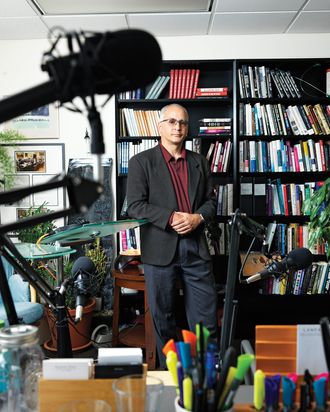
When Benjamin Wittes meets me for lunch at the century-old Tabard Inn in Washington, D.C. — the city’s original boutique hotel — he’s just wrapping up a phone call. “I was talking to a friend,” he says. “A personal friend.” I ask if it was Jim Comey. “It was not Jim Comey.”
You never know. After the FBI director was fired in May, Wittes relayed to the New York Times a bombshell conversation he’d had with Comey about Trump’s apparent attempts to sway the bureau’s Russia investigation. Then Comey testified before the Senate Intelligence Committee that he’d asked a close friend to disclose yet more Trumpian impropriety to the Times. “And that was Mr. Wittes?” asked Senator Susan Collins. It wasn’t, but no matter.
Suddenly, he was D.C. famous; the very next day, Collins and Wittes bumped into each other in the Morning Joe greenroom. “It used to be that what was going to be written on my tombstone was ‘Benjamin Wittes, former Washington Post editorial writer,’ or ‘Benjamin Wittes, who wasn’t even a lawyer,’ ” he says. “Now it’s just, like, ‘Benjamin Wittes, who’s a friend of Jim Comey’s.’ ”
Wittes, 47, a fellow at the Brookings Institution, co-founded the website Lawfare in 2010. Before the election, it existed as an insider-y national-security forum. It was smart and provocative but basically written for the benefit — and from the hawkish perspective — of the U.S. intelligence community. Then came Trump. Rank-and-file members of the CIA and the NSA morphed in the popular imagination from metadata-snarfing desk jockeys to brave sleeper agents of the Deep State, bent on sinking the president’s leaky ship. By the time Trump began to turn on the people investigating his ties to Russia — you know, Wittes’s friends — Lawfare was going to war with the president on a daily basis. Readers noticed; the site attracts 600 percent more traffic than it did a year ago.
Desperate times call for … shameless political expediency. Sean Hannity, who once agitated for Julian Assange’s arrest, today defends WikiLeaks with gusto. Comey went from public enemy to patriot — or vice versa, depending on whom you voted for — in the span of six months. And now liberal America turns to an opaque national-security apparatus, and one of its chief defenders in Wittes, as a bulwark against creeping fascism. The week he and I met in D.C., Rachel Maddow (who’s written a book decrying the military-industrial complex) marveled at Wittes’s Twitter feed on her show.
Wittes can strike a gleefully morbid tone, unsure whether to lament or celebrate each new whiff of scandal. After Trump’s election, he presciently warned of Comey’s firing. Post-inauguration, Lawfare was the first to publish the blistering dissent, signed by a thousand livid State Department employees, against Trump’s travel ban. Wittes began tipping readers off in signature style (“tick tick tick tick tick tick tick”) to Russia-related bombshells. Emboldened by his viral creations, he’s recently started blowing things up with a miniature cannon, filming the carnage in slow motion.
“There’s all kinds of crazy right-wing conspiracies about me,” he says after ordering a Diet Coke, four oysters, and a bacon cheeseburger. “Hannity is convinced that I’m this sort of secret channel of all leaks.” The Fox News pundit had been tweeting at him for a couple days now, addressing him as “Mr Tick Tick.” “I’ll fight Hannity any time any place,” wrote Wittes, who holds black belts in aikido and Tae Kwon Do. Yet he has since retired the meme. “It seemed to be causing people a lot of anxiety.”
Twitter celebrity takes a toll. “Our site says we’re about hard national-security choices. I haven’t thought about a hard national-security choice in nine months,” he says. “I’ve thought about a bunch of easy national-security choices. Should we keep everyone from Somalia out of the United States? That’s a fucking dumb national-security choice. Should we blame federal judges for explosions that haven’t happened yet? These are not the problems I want to think about.” But his new fans come for the Russia scoops, as if impeachment proceedings would commence once he racked up a certain quota.
This puts Wittes’s readers, if not Wittes himself, in a somewhat awkward spot. As much of the GOP cravenly looks the other way, Democrats have embraced the authority of the intelligence agencies and cheered on Bush-appointed prosecutors. Wittes wants to be clear. “I don’t lead any kind of resistance,” he says. “I keep warning all of our newfound admiring readers that I’m not part of that world. You know, the day we have sane government again, including, by the way, sane conservative government, I’m going back to being an apologist for the national-security state. And I won’t even have to go back to it! Because that’s actually what I am.”
In the 1990s, when Wittes was a reporter for Legal Times, he began digging into the Justice Department’s secret FISA court, which would later be criticized in the Bush and Obama years for greenlighting dubious surveillance orders. He wrote a Harper’s story comparing it to COINTELPRO, the FBI snooping operation that targeted Martin Luther King Jr., among others. Yet his reporting ultimately convinced him of the basic decency of the intelligence community — a perspective not shared by all of Lawfare’s new liberal fans. “It started a process that said, ‘Hey, wait a minute, these people take their responsibilities, including civil liberties, extremely seriously.’ ” The 9/11 attacks contributed to Wittes’s hawkishness, and he viewed Bush-era civil libertarians as a mob of unserious, overwrought ninnies. He’s since boosted drone warfare — over lunch, he makes a casual reference to “dusting” terrorists — and regularly slams Edward Snowden. This year, he backed Neil Gorsuch’s nomination to the Supreme Court.
Back at his eighth-floor corner office at the Brookings Institution, Wittes steers me to his political curios, like a bizarre photomontage sent to him after a visit to Guantánamo Bay. It looks like a vacation album — there are no detainees pictured — and is signed “Thanks for visiting GTMO!” I tell him it’s creepy. “I love it,” he responds. Underneath it, fittingly, is a gag plaque from a former colleague honoring him with a “Handmaiden of Power Award”: In recognition of the superior efforts in undermining civil liberties, and with the utmost gratitude for services rendered to the national security establishment … Thanks for toeing the company line.
“I tweeted it, and lots of people on the left took it seriously,” Wittes says, beaming. I ask him if he regrets years of reflexively defending Executive power, given the executive currently occupying the White House. No, he says. “My point is that what is wrong with Trump and the power of the presidency is not how he’s using powers at the margins of the presidency” — like dusting terrorists — “it’s how he’s using the uncontroversial powers of the presidency. Nobody doubts the power to fire the director of the FBI.” In other words: “You cannot denude the presidency of the substance and power of its office. It can’t be done. The only way to tyrantproof the presidency is not to elect tyrants to the presidency.”
Or hope that Robert Mueller — provided he stays employed — scrounges up some juicy impeachment bait. Not that Mr. Tick Tick, for his labors, is convinced Trump’s Russian entanglements will bring him down. “Each of these revelations is a piece of a larger mosaic, and I don’t know what that larger mosaic shows,” he says. As he put it over lunch, “Anybody who argues that Donald Trump is president because of Russia’s intervention is saying way more than the facts will support.” But that’s not the sort of thing you blast out alongside a baby cannon.
*This article appears in the July 10, 2017, issue of New York Magazine.






























